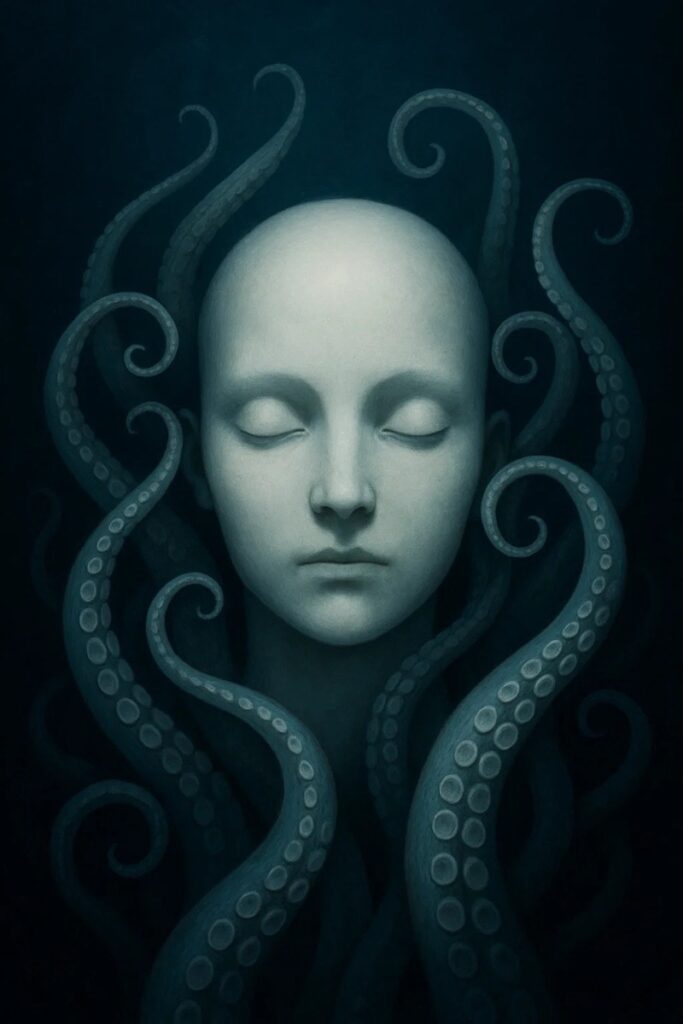Compiled fragments. Context fluid. Sources uncertain. See Addendum D: “The House.”
Entry 1 – From the Glovebox Journal (Blue spiral-bound, rain-warped)
undated
There was never a destination. Just a feeling. A tug in the gut like a fishhook made of want. We left the apartment key on the table and didn’t close the door behind us. It felt wrong to lock it. Like pretending we’d come back.
We took the interstate first, then smaller highways, and then the roads that didn’t have names, only numbers. Then roads without numbers. Then dirt, and then gravel, and then something else—paved with broken shells and old, bleached bones.
The GPS stopped giving names. It just said: “Keep going.”
So we did.
Voicemail, transcribed (number unlisted)
you hear wind, you hear static, then:
“…I don’t think I’m alone in the car anymore. I haven’t picked anyone up. Haven’t stopped in hours. But the backseat creaks when I go over bumps. And I keep adjusting the rearview even though there’s nothing to see.
I don’t know how long I’ve been gone. My phone calendar says 2041, but the last gas station had a TV playing the 1996 Olympics.
I just want to find the place. The one from the dream. The house with the porch light on. I think if I make it there, I’ll remember who I was before… before whatever this is.”
Excerpt, Child’s Composition Notebook (found beneath passenger seat)
dated in crayon: Feb 30th, 2017
My mom says we are running but we are not running like tag running but like run away running. She says the trees are listening and the road is folding up behind us like a story we aren’t in anymore. I miss my bike but she said it couldn’t come with us. I saw someone in the ditch. He waved but his hand was wrong.
The slushie at the gas station was blue. I like blue. It turned my tongue weird and mom said don’t stick it out at people but I didn’t. There were no people.
Just him.
The man with the wrong hand.
Addendum A – Field report, unsigned, undated
(Handwritten on “Chevron” branded receipt paper)
Subject appeared normal until we passed exit 19, the one with the billboard that changes depending on your secrets. They didn’t speak for a while. Then they said they remembered the house.
Not from this life, maybe.
Maybe the last one.
Maybe their next.
They got out of the car and walked into a ditch that wasn’t there. When I followed, it was just woods. But something had changed. My watch ticks backwards now. I wake up before I fall asleep.
I don’t think this report will be read.
But I’m writing it anyway.
Because the house waits for all of us.
Fragment recovered from backseat upholstery (stitched into lining)
Handwritten. Ink. Possibly blood. Lettering uneven.
“The house is real. It remembers you. Even when you don’t. Even when you were born someone else.”
Visual Description, via Sleep Study Participant #418
Session: Delta-phase induction, deep theta cycle
“I dreamt of the house again. Porch sagging like a tired mouth. Barnacles on the eaves. Every room was filled with someone I used to be. One had no face, just a loop of old cassette tape where the head should be. Another had too many mouths, all whispering apologies I haven’t earned.
I opened a door and the ocean was there.
Not water.
Something wet.
It reached toward me with limbs that remembered me before I was born.”
Entry from “The Blue Slushie Logs” – roadside folklore wiki (flagged for deletion multiple times)
User: LongHauler1137 | Edited: Unknown
Post Title: “House That Eats Drivers”
Saw it again last night.
Pulled off near Mile Marker 442. There’s a turn that isn’t there during the day. If you take it, the air gets thicker, like driving through breath. People say if you make it to the house, you won’t be hungry anymore. Or maybe you’ll be finally hungry for the right thing.
My cousin went once. Said she didn’t see a house. Just a mirror in the middle of a field.
It was raining inside the mirror.
Final Entry – [no source]
They aren’t trying to trap you.
They aren’t trying to rescue you either.
They are just… there. Waiting. Coiled in memory. Unspooling slowly, across all the wrong roads, hoping you’ll arrive not when you want to—but when you’re ready.
Glovebox Note
Found beneath a map with no roads left.
Some places remember you.
Even if you were never there before.
Even if you never meant to leave.
